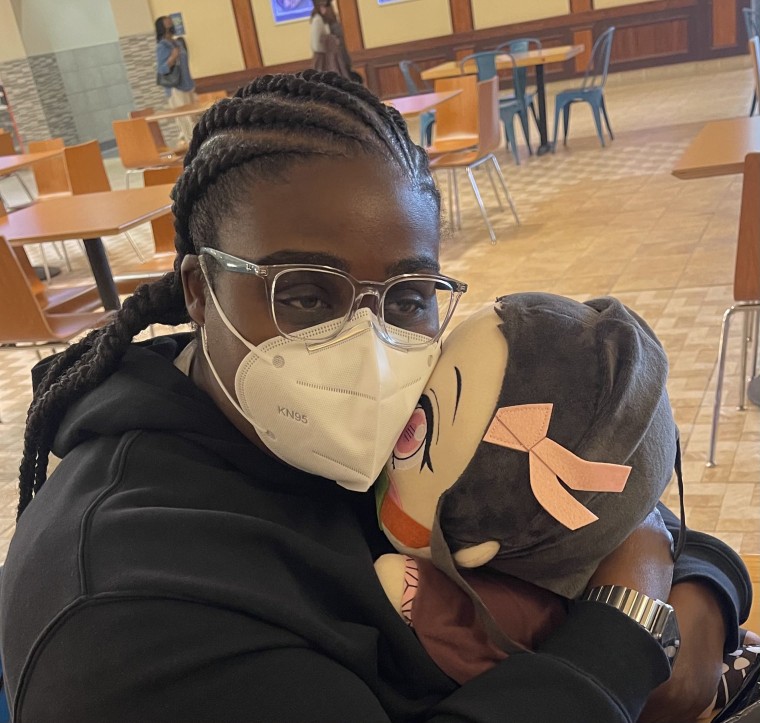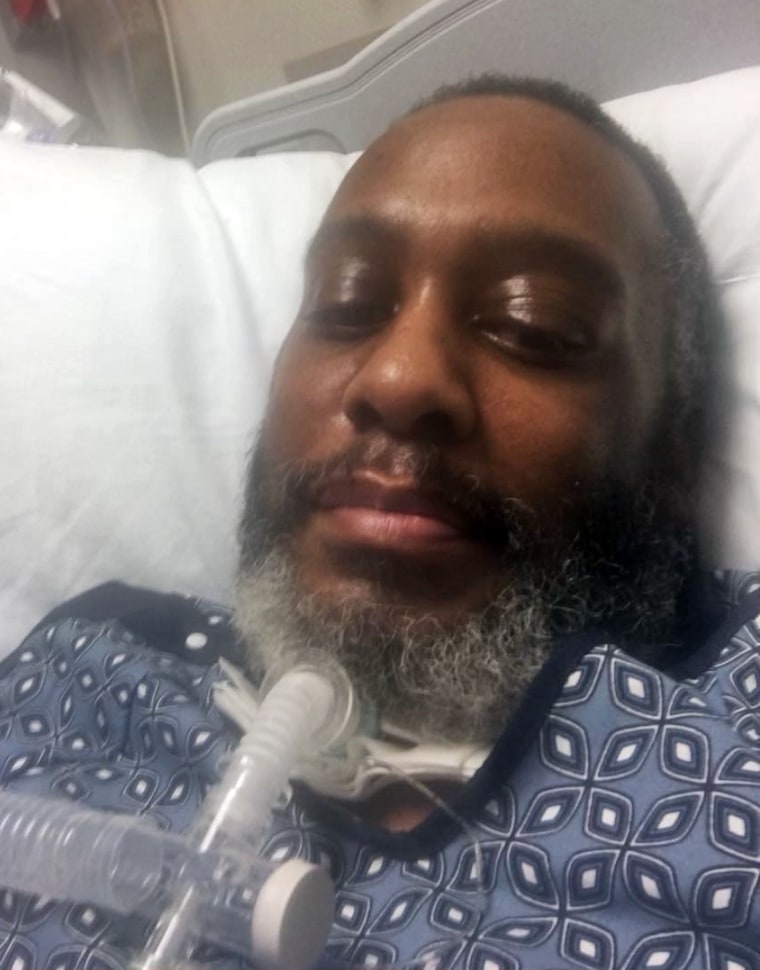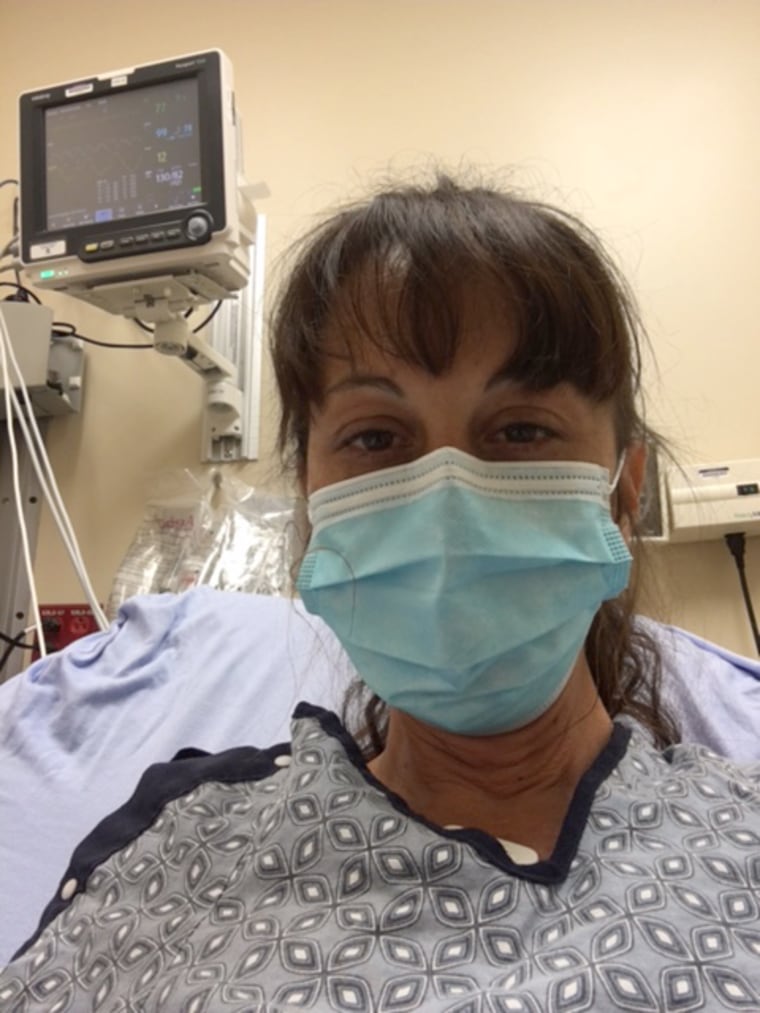Mike Heidenberg was forced to step away from his job at a New York college when he developed Covid-19 symptoms in the spring of 2020. Almost two years later, he still feels too sick to return to work.
Heidenberg, 48, is one of an untold number of Americans grappling with the mysterious effects of what has become known as long Covid. His concerns now go beyond his health.
“We can’t sustain living in this apartment we have called our home for 13 and a half years,” said Heidenberg, who had been working as a student adviser at Berkeley College in Westchester County.
Since the pandemic unemployment benefits ended last September, he has had to rely on donations from his local synagogue and a GoFundMe page to supplement his lost income. His employer-provided disability insurance cut him off in August 2020, which he said caused his blood pressure to spike into the 180s.
“It literally sent me to the emergency room,” he said.
Heidenberg’s problems are not unique.
An NBC News investigation into how the social safety net is responding to “long Covid” revealed critical gaps in the existing assistance programs.
Two taxpayer-funded programs are supposed to protect workers against lost income — unemployment insurance and long-term disability insurance — but neither is an option for most Americans with long Covid, who may be too sick to work but not ready to depart the workforce altogether.
“Long Covid cases fall into the huge middle ground between ‘I have a cold’ and ‘I have stage four pancreatic cancer,’” said Kathleen Romig, director of Social Security and disability policy at the Center for Budget and Policy Priorities. “That’s where we really have a huge gap in this country.”
Interviews with more than three dozen people across government agencies, medical fields and disability law practices revealed that large numbers of Americans are trying — and failing — to get financial assistance as they battle lingering Covid symptoms.
In recent months, medical experts and patients have been trying to sound the alarm that more needs to be done to help people with long Covid grappling with rising medical costs and lost income. Some are hoping that President Joe Biden will raise the issue in his State of the Union address Tuesday night.
But so far, efforts to prompt government action have largely gone unanswered.
“The system is gearing itself against individuals with long Covid,” said Dr. David Putrino, director of rehabilitation innovation for Mount Sinai Health System in New York. “And that makes them sicker and sicker over time … causing them so much stress and exertion as they’re trying to get care that it actually makes the condition worse.”
Uphill battle for benefits
An estimated seven to 23 million Americans have experienced “long Covid,” a catch-all term for roughly 200 symptoms ranging from memory issues to chest pain to dizziness upon standing.
Scientists still don’t know why some people get over their Covid symptoms in a few days while others go weeks, months and years. Experts say the wide range in estimates of people with long Covid is due to the lack of widespread testing earlier in the pandemic and shifting medical definitions across studies.
Absent a population-wide effort to track the long-term effects of Covid-19, it remains unclear how many American workers have been sidelined with long Covid — and which populations are most affected.
An NBC News survey, released through social media platforms, received over 1,700 responses from adults who reported experiencing long Covid symptoms — and nearly 1,000 people said they lacked resources to manage their condition.

“We are a big family, but we lived on that stimulus check,” said Latesha Holloman, a 38-year-old mother of five daughters, ages 19, 16, 15, 13 and 12. “We don’t have any more savings.”
Holloman has been unable to work for over a year, since she contracted Covid-19 while working at the front desk of a health care company in Virginia. She has since applied for workers' compensation, private short-term disability insurance and unemployment insurance — and was denied at each turn, she said.
“It really shattered me, and I did fall into depression over it,” said Holloman. “And still, I’m hurt and angry. I just don’t understand why I cannot get compensated for losing income from getting Covid.”
Her disability insurance policy denied her claim, despite attestations that she struggled with talking, walking more than five minutes, or carrying more than five pounds. The Virginia Employment Commission, meanwhile, denied her unemployment claim because she “was not able to work due to medical reasons.”
“Unemployment says I can’t work. Disability says I can,” said Holloman. “Who is right?”
More than 1,000 people who responded to the NBC News survey reported that long Covid had severely affected their ability to work or left them unable to work at all. Almost all survey respondents who applied for disability benefits — nearly 600 people — said they encountered difficulties in the process.
Many patients experience symptoms that doctors struggle to document, like fatigue and nervous system dysfunction. On the NBC News survey, over 850 people reported that a medical professional had questioned whether their symptoms were real.
Even at Mount Sinai’s Center for Post-Covid Care in New York City, Putrino said it is “luck of the draw” whether insurers accept his team’s clinical opinion that a patient needs time away from work.
“We try to be as objective as possible with all of our evaluation,” said Putrino, whose team has managed the care of over 1,500 patients with long Covid. “But often, our most strident proof can just be dismissed with a single email saying, ‘This isn’t enough.’”
Many who were denied benefits said they had no choice but to return to work in order to manage rising medical bills.
“If my employer knew the shape I am actually in, I wouldn’t have a job,” said a home health care worker in Pennsylvania, who told NBC News she has over $10,000 in medical debt and is trying to conceal her neurological issues from her employer while caring for patients with severe disabilities.
“I would have messed up their meds a billion times by now if I didn’t have so many backup checks,” she added.
A challenging system
For Americans with long-term disabilities, there is another path to benefits: Social Security, which pays out $1,360 per month on average to disabled workers.
But it is not an ideal fit for people with post-Covid symptoms: Two-thirds of all claims are typically denied, the process takes years and benefits only go to people who are expected to be disabled for at least 12 months to the degree that they cannot work any job at all.
“It is a very challenging system,” said Jason Turkish, president and managing partner at Nyman Turkish, a leading disability law firm. “They are trying to work through a process that is absolutely not designed to work well in this dynamic.”

Corey Sexton first applied in June 2020 after spending 57 days in the hospital with Covid, including three weeks on a ventilator, and receiving a tracheotomy. His claim has already been denied three times, most recently by a federal administrative law judge.
The judge was not persuaded by the opinions from Sexton’s doctors that he was unable to work, ruling that Sexton could manage sedentary unskilled work without any fast-paced requirements.
It was “a punch in the gut” for Sexton, who used to test guns as an employee for Glock, and now said he struggles to drive or shop for groceries without help. He has one more chance at the federal appeals level — but even if the claim is ultimately successful, his family will be waiting at least another year before payments.
“We had to take out credit cards to stay afloat, now they’re maxed out too,” Sexton, who lives in Georgia, said. “We’re thinking something has to kick in from the government so we can just live.”
Plea to lawmakers
In January, a patient-led organization called the Covid-19 Longhauler Advocacy Project sent an open letter to over 3,000 officials — including the White House, every member of Congress, and the governors of all 50 states.
The group received just three responses — from Rep. Ayanna Pressley, D-Mass.; Rep. Cori Bush, D-Mo.; and Sen. Tim Kaine, D-Va. — said Karyn Bishof, a former EMS worker in Florida who founded the group.
“All these people who are completely out of resources at this point, with no programs currently in the works, what are they supposed to do?” said Bishof, 32. “There’s nowhere for them to turn and nowhere for them to go until we get our lawmakers to act on our behalf.”
The letter from Bishof’s group suggested dozens of new policies — from a 9/11-style compensation fund to an additional question on the Bureau of Labor Statistics survey.
But their first goal, Bishof said, is for Biden to address long Covid in his State of the Union address.
“It’s probably the first time that half of the people watching will even hear the term ‘long Covid,’” Bishof said.
Last summer, the Biden administration issued guidance that long Covid could fit the definition of disability under the Americans with Disabilities Act, which gives employees a legal framework to negotiate workplace accommodations. But neither Congress nor the White House has proposed any new policies around long Covid, other than funding studies and data collection.
But for experts and officials the question of how to develop policy around long Covid is daunting. Some scientists believe long Covid — a term coined by patients — will grow to encompass a collection of post-viral illnesses that have long existed in society without proper documentation.
“It could require a Herculean investment to really assess the disability here,” said Dr. Anthony Komaroff, a clinical investigator at Harvard Medical School.
“The disability assessment system in the United States contains so few people relative to the potential burden of long Covid that it will never effectively happen unless something very innovative is done.”
The situation is especially bleak for people like April Partridge, a Florida artist who is one of the estimated 50 million Americans who lack disability insurance.

Partridge, 41, specializes in historical restorations, sculptures and mosaics. But for the past two years, she has been stuck in a cycle of long Covid in which even painting can trigger a wave of inflammation across her body that puts her down for days.
Her symptom flare-ups have landed her in the emergency room three times, and she now lives in a rented camper in the woods with her 5-year-old daughter, Coral. But each month, she needs to sell enough art to keep a roof over their heads.
“I’m setting myself back every single time, but I don’t have a choice because I have a kid I have to take care of,” said Partridge. “It’s like, what else can I do?”
https://www.nbcnews.com/investigations/got-long-covid-cost-dearly-rcna17942
No comments:
Post a Comment
Note: Only a member of this blog may post a comment.